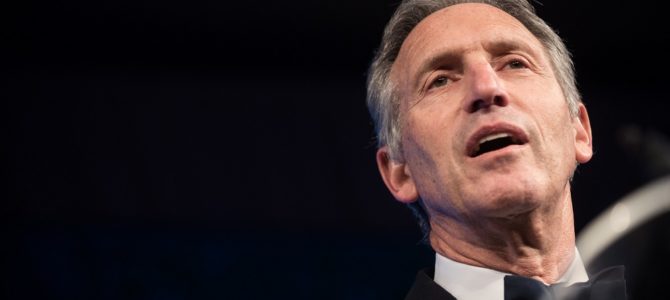“To see how our fashion editor likes her Blue Diamond Whole Natural Almonds, just head to goop.com,” Gwyneth gently lilted. It was an abrupt but fitting ad disruption squeezed mid-podcast with “likely” presidential candidate Howard Schultz, former CEO of Starbucks.
Schultz’s interest in the presidency, announced on “60 Minutes” last Sunday, has not been well-received. He’s either a spoiler, sure to steal critical votes from President Trump’s Democratic opponent, lost in a fantasy borne of his own egomania, or a laughably out-of-touch elitist, far more in sync with latte-sipping urbanites than the middle class— all of which are probably all true.
Schultz’s interview on the Goop podcast won’t do much to dispel such concerns. The businessman’s conversation with Paltrow was bookended by her musings on Capri (Schultz recalled finding inspiration in Italy’s “ritual of espresso”), and a description of his less-than-relatable daily coffee routine. Every morning, Schultz said, he grinds a fresh cup of coffee “aged in the tropics for five years before it’s roasted.”
“The aging,” he glowed, “produces an earthiness like a Bordeaux wine that I love.”
Yet Schultz made at least one good point about his resume during the interview: “I have the rare sight lines in the fact that Starbucks has stores in almost every community in America,” he noted. Of course, communities still lacking easy access to $5 grande macchiatos are probably the places that generally like President Trump, and remain foreign to Schultz. And there are plenty of voters in and around cities who have access to Starbucks, just no room in their budget to afford it.
But with an eye on the last presidential cycle, one can sense the early stages of a compelling campaign message. “There are a lot of people in America who are facing despair and hopelessness— and their life is not based on the stock market,” Schultz added. “Their life is based on whether the promise of America is still available to them.”
Platitudes abounded. Schultz dispensed vapid musings like, “This is a time to embrace country over party” and “When you hear about the American dream, it connotes a vivid picture of possibilities” over the musical clanging of silverware (Paltrow said the podcast was recorded at a bar). He decried the “hate and vitriol” being “spewed by this president and his enablers,” and spent plenty of breath knocking both sides of the aisle for prioritizing ideology over pragmatism.
But for all its self-indulgence and naïveté, that sounds kind of familiar, doesn’t it? Conventional wisdom suggests there’s no real path for a centrist billionaire with no political experience, an arsenal of stupid platitudes, and a shameless affinity for luxury. Conventional wisdom has failed us memorably in recent years.
Schultz is not Donald Trump, and he almost certainly will not be the next president of the United States. There is no vast constituency of Goop voters. But as easy as it would be to mock him for talking stocks with the purveyor of $66 jade vagina eggs, I think there’s something to be said about how tycoons and entertainers reflect voters’ aspirations. (Also for how far non-traditional media credibility can travel in politics.)
A wealthy candidate chatting with the avatar of Hollywood elitism about their Italian excursions and espresso rituals could pass for satire. But is it effective to demonize habits the rest of us wish we could afford?
A lingering suggestion from 2016 seems to be that Americans aren’t so bothered by eye-popping net worths as long as they’re coupled with what passes for sincere and resonant concern about the middle class. Schultz may not be capable of producing that, but when he loses, I’m not so convinced it’ll be because of his taste for aged Sumatra coffee.









